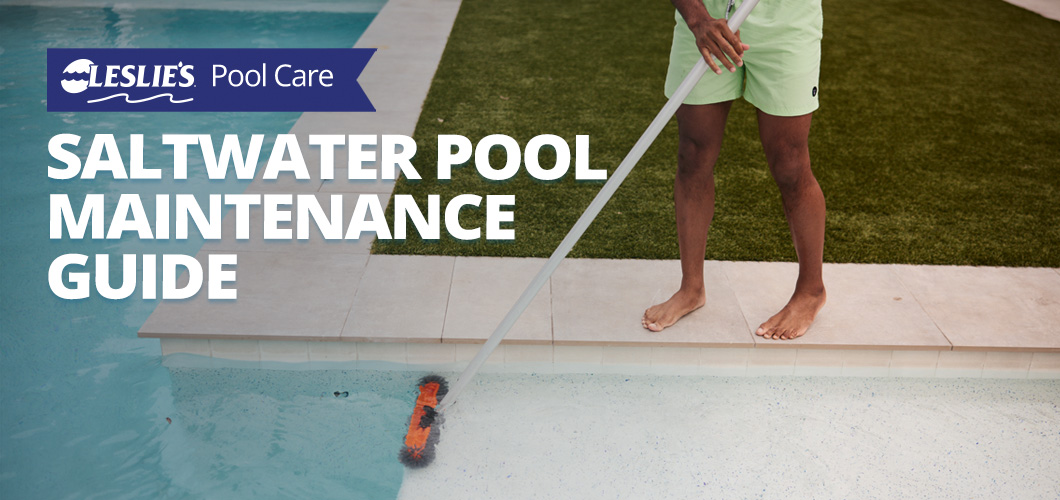
Saltwater Pool Maintenance Guide
Saltwater pools are becoming increasingly popular due to their gentle and soothing effects on swimmers. However, regular maintenance is crucial to maintain the pristine condition of a saltwater pool. In this guide, we explore the key aspects of saltwater pool maintenance, including monitoring salt levels, balancing water chemistry, caring for the salt cell, regular cleaning, and ensuring proper water circulation. By following these maintenance practices, you can enjoy a refreshing, clean, and inviting saltwater pool all season.
1. Maintain Balanced Water Chemistry
Whether you have a chlorine pool or a saltwater pool, maintaining balanced water is the foundation of a clean, safe pool. Balancing your pool water chemistry is the first step to ensuring a fun, relaxing, and healthy environment for swimmers. And while balancing saltwater isn't much different than balancing chlorinated water, there are a extra few things to keep in mind. Let's take a look...
pH & Total Alkalinity
Due to the high salt content in saltwater pools, it's normal for the water to have a slightly elevated pH level. Therefore, it's important to test your pool's pH once a week to ensure the level doesn't rise above 7.6, as that can cause serious skin and eye irritation, and scaling on your equipment. Use a pH decreaser like Leslie's Dry Acid to lower the level into the ideal range of 7.4–7.6.
Total Alkalinity (TA) doesn't need to be tested weekly, but since it acts as a buffer to pH, it should be tested at least once a month. The ideal range for TA is 80–120 parts per million (ppm), and can be adjusted with the appropriate balancing chemicals.
Calcium Hardness
Due to the salt cell's sensitivity to scale buildup, regulating your pool's Calcium Hardness level is essential to extending the life and efficiency of the cell. Lowering the Calcium in your pool requires partial draining and refilling, which is a time-consuming and costly process. So, sticking to a once-monthly testing schedule will help you maintain a Calcium range of 200–400 ppm, and avoid major problems.
Salinity
The recommended salinity level varies for each salt system, so it's vital to not only adhere to the manufacturer's recommendations when adding salt, but also test the level monthly. Ideally, salt levels should range between 2,500 and 3,500 parts per million (ppm). If the pH and TA levels seem out of whack, that's typically a good indicator that the salinity level is either too high or too low. Additionally, most salt systems, like the Hayward AquaRite, alert you to any salt irregularities directly on the control panel.
Chlorine
Even though you have a saltwater pool, you still need to test and balance the chlorine level! Once a week, test the water to verify the Free Available Chlorine level is within the range of 2.0–4.0 ppm. If the chlorine is too low, first inspect your salt system and adjust the chlorine output if needed. Then, add a dose or two of shock to your pool to raise the chlorine level.
2. Take Care of the Salt Cell
While your pool pump is the heart of your entire pool, the salt cell is the heart of your salt system. If this invaluable piece of equipment doesn't work correctly, your salt system, and ultimately your pool, will suffer greatly. Therefore, caring for your salt cell is crucial, as it ensures the longevity and efficiency of the whole salt system.
At least once every other month, inspect the salt cell for debris buildup, scale, or other mineral deposits. Scale buildup can drastically reduce the output and lifespan of the salt cell, and result in costly repairs. To examine and clean the cell, first turn off your pool pump and remove the cell from the unions. Then look for signs of scale or other buildup on and inside the cell. If you determine your salt cell needs to be cleaned, follow the steps in this article.
PRO TIP: Want to take your salt cell care to the next level? Try a salt system additive, like Natural Chemistry's two-part Salt Water Magic system! This product optimizes the performance of your entire salt system by eliminating phosphates and organic contaminants, in addition to utilizing sequestering agents to prevent metal oxidization and scale buildup.
3. Ensure Adequate Water Circulation

Just like maintaining balanced water chemistry, adequate water circulation is a crucial part of sustaining a clean and healthy pool. Proper water circulation helps distribute chemicals, prevent stagnation, and maintain consistent water quality.
Program your pool pump to run at least 8–10 hours every day to ensure at least one complete water turnover. You may need to increase the run time in the warm summer months to avoid stagnation, which leads to algae growth. And inspect and clean the skimmer and pump strainer baskets every few days. Clogged baskets lead to reduced water flow, which leads to reduced circulation.
4. Clean Your Pool Weekly
Keeping your saltwater pool clean is essential for preventing algae growth, maintaining water clarity, and prolonging the life of pool equipment. Weekly skimming, brushing, and vacuuming are the three best ways to reduce debris buildup, increase water clarity, and enhance overall pool health.
5. Maintain Appropriate Water Temperature
Because saltwater chlorinators do not function in cold water, most salt systems will shut down in water temperatures of 60ºF or below. And when water temperatures go up in the summer, chlorine consumption increases. Warm water requires salt cells to run longer, or operate at a higher output percentage to maintain chlorine levels.
For this reason, many saltwater pool owners use tablets or granular chlorine when the water temperature is below 70ºF. Monitoring the water temperature inside your saltwater pool is imperative to keep water levels flowing and maintained properly.
PRO TIP: Not sure what to do with your salt cell during winter? Don't fret, we have an article for that! If you close your saltwater pool for the winter, don't miss out on this informative article about how to care for your salt cell during the frigid months.
The next time you hear someone saying that saltwater pools are so much easier to maintain, take it with a grain of salt! Saltwater pool maintenance requires the same amount of TLC you would give to a traditional chlorine pool. But no matter what type of pool you have, the experts at Leslie's are here to help. Stop by your neighborhood store and stock up on all the supplies, chemicals, and products you need to keep your salty oasis in top shape.